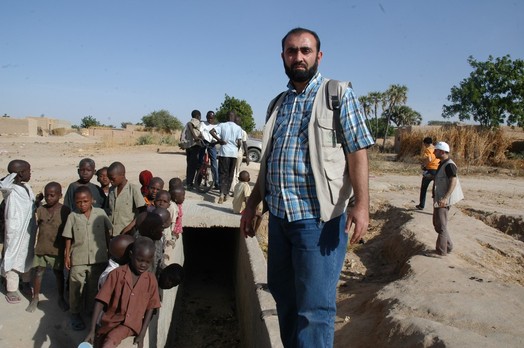
Cevdet Kiliclar was a humanitarian aid worker. He worked as the technical coordinator of the press room onboard Mavi Marmara, the flagship of the Freedom Flotilla which sailed to break the embargo on Gaza and deliver humanitarian aid to the people of Palestine. As a result of the armed Israeli attack on the flotilla, he lost his life.
Cevdet Kiliclar was born in Kayseri in 1972. He studied Media and Communications at Marmara University, Istanbul. While he was in college, he married Derya whom he had known since high school. They had two children, a son and a daughter. Gulhan is 15 years old and Erdem is only 13. He worked as a journalist for many years following his graduation. Then, he went to Germany for his Masters. After returning to Istanbul, Kiliclar worked for Vakit, a daily newspaper in Turkey.
He began working at IHH in 2008 and travelled to numerous countries as a volunteer of the Foundation, recording his observations through a camera and delivering the striking reality of those regions to us. In 2009, no matter how much Kiliclar wanted to join the Viva Palestina convoy, he could not make it thanks to his busy work schedule. He was very excited to finally be able to join the Freedom Flotilla which would sail to Gaza and deliver much needed humanitarian aid by breaking the embargo. He filled in the application form and put “I’ll do anything to help” into “the proposed working field onboard” box on the form. He was ready to do his best to serve humanity and justice.
He lost his life during the Israeli terrorist attack on Mavi Marmara at the dawn of Monday, the 31st of May, 2010. He was taking photographs of the terrorist attack when he was shot dead. Those who were with him during the incident report that he ran to the upper deck, saying “We should not let this go unrecorded”. He was a journalist and a brave man. He performed his duty till the last moment. He was shot in the forehead while recording the attack with his camera.
Dimitris Plionis, a Greek activist onboard, said “Despite the electronic attack and blackening by the Israeli navy, Mavi Marmara was able to send pictures until about half an hour after the attack thanks to the efforts and equipment of a Turkish activist onboard.” Cevdet Kiliclar worked really hard to let the whole world witness the terrorist attack of Israel.
Bodies of 9 activists from Mavi Marmara went under autopsy. However the nature of one bullet, out of 30 bullets found in those bodies, was not quite clear. A rarely used type of bullet was found in Kiliclar’s head which penetrated through his forehead and remained inside his skull without scattering. Forensic scientists report that the specific type of bullet is used in certain shotguns which are mainly employed by the military for ballistic breaching of doors.
The ammunition used by the Israeli navy to murder Kiliclar is called a "bean bag round," a type of shotgun shell used for semi-lethal apprehension of suspects. A bean bag round, also called as a flexible baton round, can severely injure or kill in a wide variety of ways. A baton round can hit the chest, break the ribs and send the broken ribs into the heart. A shot to the head, on the other hand, is deadly. Such weapons are employed by the U.S. and Israeli police in riot control, prisoner control, crowd control, refugee control, and self-defense.